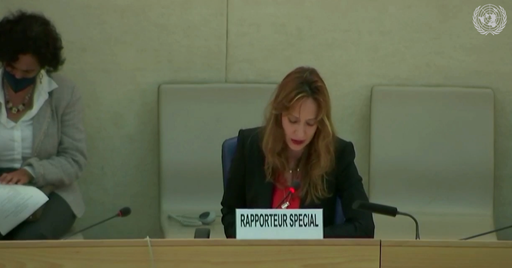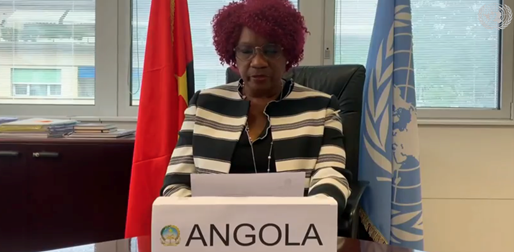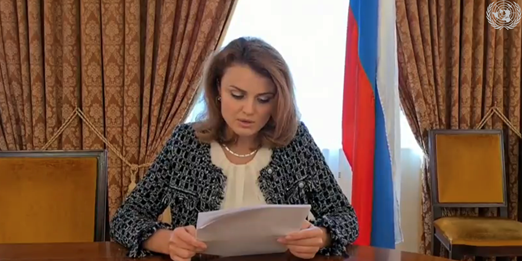The 48th Session of the Human Rights Council
13 September - 8October 2021
ITEM 3 – Promotion and Protection of all Human Rights, Civil, Political, Economic, Social, and Cultural Rights, Including the Right to Development
Interactive Dialogue with Expert Mechanism on the Right to Development
(16 -17 September 2021)
By: Tristan Arlaud/GICJ
Executive Summary
On the fourth day of the 48th Session on September 16 and 17, 2021, the Human Rights Council held an Interactive Dialogue with the Expert Mechanism on the Right to Development (EMRTD). The EMRTD has a recent mandate as it was established during the Covid-19 pandemic. Given the notorious impact of the global crisis on the Right to Development, it was decided that a particular body needs to investigate the different challenges societies face and provide rigorous guidance to all states for the upcoming years.
The Interactive Dialogue took place in Geneva, where most participants provided online interventions on the reports submitted prior to the meeting and general independent observations on development. The theme of the duty of international cooperation governed the discussion and the urgent needs to address the climate crisis, the Right to Development as an inalienable human right, vaccine nationalism, and the exacerbation of social inequalities over the past two years.
Sub-Saharan, MENA region, and Asian delegations actively participated in the dialogue and numerous civil society organizations alongside National Human Rights Institutions.
Background
Thirty-four years ago, the United Nations General Assembly adopted the Declaration on the Right to Development. Development's primary aim is to improve everyone's wellbeing. It is “an inalienable human right by virtue of which every human person and all peoples are entitled to participate in, contribute to, and enjoy economic, social, cultural and political development, in which all human rights and fundamental freedoms can be fully realized.” (OHCHR)
Ever since the breakout of the Covid-19 pandemic, developing and underdeveloped nations have faced countless challenges and encountered several obstacles, resulting in increased human rights violations and restricting progress towards development. Nine years away from the closing of the Sustainable Development Goals (SDGs) agenda, we are still dramatically far from reaching the set economic, social, environmental, and political objectives. Today, there is an urgent need to act in global partnership, not independently, but together as clearly set out under SDG 17.
"Born of the common aspiration of newly independent nations, the Declaration of the Right to Development made development a right for all individuals and peoples, with active, free, and meaningful participation in its process and fair distribution of its benefits. Locally and globally. For present and future generations."
- Michelle Bachelet, United Nations High Commissioner for Human Rights
Report of the Expert Mechanism
Among a bundle of unveiled OHCHR and the Working Group’s reports, the Expert mechanism mainly directed this meeting's focus on Operationalizing the Right to Development in achieving the Sustainable Development goals (A/HRC/48/62).

The report provides essential guidance to all countries when adapting their national legislative framework for better development. Firstly, it dwells on the normative framework of the Declaration on the Right to Development. Restating what the right truly encompasses as an inalienable human right, guaranteeing citizens to participate in, contribute to and enjoy economic, social, cultural, and political development. Drafted three decades ago, the entailed states' duties are all-similar today. After that, it elaborates on the relation between the right and sustainable development. This calls for a “development that meets the needs of the present without compromising the ability of future generations to meet their own needs," a reminder that the right to development gives the SDGs proper shape, color, and texture.
For guidance purposes, the report gives thorough explanations on operationalizing the right. Divided into clear sections, it requires states to identify development priorities and obstacles at all levels and to set national targets. It is the first thematic report provided by the mechanism, drawing attention to the urgent need to move beyond the rhetoric and to strive for greater acceptance, operationalization, and realization of the right to development across all three levels of obligations of States.
The obligations demand states to collaborate in global and regional partnerships and refrain from acting individually. By working restrictedly alone when adopting development policies only to affect people under their jurisdiction, governments stymie the 2030 agenda.
A sense of an extraterritorial obligation is all-important for development. SDGs can only be realized through a credible, effective, and universal commitment to the means of implementation based on the normative framework of the Right to Development, especially the duty of international cooperation. In this regard, the Expert Mechanism stresses the urgent need for states to discharge their duty to cooperate. A commitment to cooperate curbs the central theme of the study. Eleven recommendations were also addressed to states, individually and jointly, and international organizations closely working with all stakeholders to implement the 2030 SDGs.
Interactive Dialogue with Expert Mechanism
The chair of the EMRTD, Ms. Klentiana Mahmutaj, was introduced by the Vice-President of the Council to give her opening statement. Initiating the dialogue, she reminded the Council that the EMRTD was established amid the Covid-19 pandemic. It is mandated to provide countries with thematic expertise in identifying and sharing best practices. Despite all challenges, the EMRTD has achieved a great deal ever since its establishment and accurately portrayed the negative impact of the existential global crisis. Back in November 2020, two formal sessions were held, including one with the Working Group. During the sessions, participants discussed two of the five thematic studies. The EMRTD brought the issues of Covid-19 and vaccine nationalism forward, two elements exacerbating inequalities and counterproductive to development. Withal, discussions during the sessions were supportive of the EMRTD’s mandate.
She further went on to present the main features of the thematic report and brought two additional recommendations to the Council's attention as follow:
- For public sessions to be webcast and to use international sign interpretation and real-time captioning in English;
- To enable NGOs beyond those with consultative status, with the ESC, to participate in public sessions of the mechanism.
Notably, she welcomed the views and guidance from member states and other stakeholders on this study in the hope that it will contribute to the deliberations of this Council and advance the agenda for the Right to Development in achieving the Sustainable Development goals.
MENA region states actively participated in the dialogue, bringing to bear some essential points. On behalf of the Organization of Islamic Cooperation (OIC), Pakistan accentuated the devastating effect of Covid-19 on social inequalities, eroding development gains, rising external debt, and resource constraints. The State of Palestine and Egypt elaborated on the undeniable correlations between fundamental human rights and the right to development. In support of the operationalizing measures, stakeholders must understand that such a right cannot be fully realized when there are countless human rights violations. Iraq highlighted the exacerbation of inequalities since 2020 and the interruption of many development projects because of diverted national budgets with developing nations aiming to contain damages. Recovery plans need to bolster cooperation between all countries and promote international solidarity as clearly enunciated by the mechanism. The Syrian Arab Republic, alongside the above-mentioned nations, stressed that the idea of international cooperation and global solidarity is anchored within the UN Charter and the Declaration on Development, and this way, should dictate states' behavior. Finally, Tunisia reiterated that SDG 17 holds this dear commitment of partnerships, and accordingly, must be acknowledged during governmental decisions planning favoring development.
There was no scarcity of sub-Saharan African countries' participation during the dialogue. As the pandemic drastically impacted the continent, most, if not all delegations took a stand by claiming that the production and distribution of vaccines must be treated as a shared public good and that the right to development is an inalienable human right that needs the utmost attention.
"Nobody is safe until everybody is vaccinated."

Angola, clearly portraying the problem, stated that the COVID-19 boundary continues to negatively affect all sectors of African societies, thus accelerating the erosion of any progress made towards development, central to the SDGs achievement. Djibouti, being grateful for the work conducted by the EMRTD, repeated the importance of looking at development from a climate perspective, sticking to the 2030 SDGs agenda. Convinced that the attainment of the right to development will necessarily be based on the rollout of international commitments to the 2030 program and other climate change aims. Interestingly, the South African Delegation stressed the need for "the UN System and all relevant bodies to mainstream the right to development in their policies' objectives and to ensure that no one is left behind." Article 22 of the African Charter is a testimony of the continental commitment towards the practical realization of development, while the SDGs are just but a global development project that gives content to the Right to Development. There is a need for clear national and international commitments through legislative frameworks. Ultimately, most nations agreed on strengthening the right to development through international cooperation and global partnerships. There is an urgency to prepare National Recovery plans, build synergy between human rights and the SDGs, ensure the right to development cohesively, and secure a sustainable recovery for all.
Asian nations reflected on their significant involvement. China, to start with, dwelled on the duty of international cooperation for states embedded in the Declaration and the UN Charter. There is a pressing need to pursue a people-centered development and the people's aspirations for better living conditions; to prioritize and mainstream the right to development. India brought forward the dire and continuous effect of Covid-19 across its nation, underlining that all long-term recovery strategies need to be drafted. While all are claiming their devotion to development and support for the mechanism, Malaysia believes the work will be more effective by calling for full support from all parties, including the OHCHR.
“The right to development cannot be realized if the development is unsustainable.”
The European Union, to the contrary, disapproves of the creation of the expert mechanism. It describes it as unnecessary in light of the Union’s engagements for development. It will, however, not refrain from engaging in its discussions and sustainable and inclusive development practices, as similar objectives lie at the heart of E.U budgets and policies.

Lastly, the Russian delegations expressed their concerns regarding other states not delivering any commitments to cooperate and the necessity to ease debt burdens and suspend sanctions on developing nations. It further made an essential point on the challenges racism and discrimination impose on the right to development as an often-forgotten issue requiring imminent action.
As part of any Interactive Dialogue, several National Human Rights Institutions and civil society organizations shared their views. Like many nation-states, all participants agreed on the right to development as an inalienable human right and the need to synergize the global community's efforts. Education was mainly featured as a critical element to the right and SDGs. The state of emergency some nations are currently facing should alarm industrialized economies to aid on social protection mechanisms; to take all appropriate measures to ensure a fair, efficient, and universal distribution of vaccines.
Concluding Remarks
Initially thanking all delegations for their active participation in the Dialogue, Ms. Mahmutaj invited all available delegations, stakeholders, and civil society organizations to follow the subsequent formal sessions of the mechanism between the 3rd and the 5th of November this year. As part of her concluding remarks, the issue of vaccine nationalism was underlined. In total agreement with all criticisms raised, the inequitable distribution of vaccines is a barrier to development. The mechanism requested TRIPS waivers to enable fair and equitable allotment and treat vaccines as a public good. The mechanism is rigorously engaged with this issue as it is directly relevant to its mandate.
The expert sincerely appreciated the Russian Delegation's comment on racism. Anti-racism, non-discrimination, and equality of opportunity are pillars of the Right to Development. The second EMRTD’s thematic study examines racism and racial discrimination as barriers to the operationalization of development in the context of three essential elements: state obligations, international cooperation, and global partnerships. Such an in-depth study aims to guide on addressing challenges and obstacles. Finally, she reminded that the mechanism invites nations and stakeholders to set up and foster a mutual and better understanding of the right to development. Issues raised during this dialogue are all examples of failures to cooperate.
Too, EMRTD members have recently engaged in furthering education on the right as a critical tool; initiatives strengthening knowledge and understanding are needed and deserve the full support of all states. Sustainable Development in the context of international investment law was highlighted as a clear example of steps forward made by the mechanism. In recent years, essential research has been conducted exploring sustainable development in legally binding treaties. Such studies and analyses have led to the drafting of sustainable development chapters and clauses within important trade agreements such as the Comprehensive Economic and Trade Agreement between the EU and Canada (CETA), Brazil-India Investment Cooperation, and Facilitation Treaty (Brazil-India ICTF).
Conclusively, the expert stressed that the advancement of the 2030 agenda is underwhelming and presently way off equitable globalization. The severe effects of Covid-19 on human lives, human rights, and economic growth reflect the absence of this much-needed international cooperation.
A global health crisis, where developing and underdeveloped countries suffer the most, with extreme poverty, acute hunger, declines in access to education, increases in child labor and child marriages, and the general deepening of foreign debts. The critical point indicates that we need to move beyond reflection and delve into concerted and joint actions to treat international cooperation as our standard legal duty.
Position of Geneva International Centre for Justice
Geneva International Centre for Justice welcomes the recommendation of the Expert Mechanism for all NGOs to participate in public sessions of the Expert Mechanism. NGOs are immense contributors to the progressive realization of economic, social, and cultural rights; ergo, their participation should not be reduced.
GICJ emphasized the importance of respecting the 2030 agenda to better our societies and improving cooperation between nations in light of the detrimental effect of climate change on all human rights. We further agree with most delegations and fully support treating vaccines as a common public good. Unless we equitably vaccinate the majority of the population in the northern and southern hemispheres, progress towards development will halt. Finally, we fully support the EMRTD's mandate and honorably participate in upcoming formal sessions.
Justice, Human rights, Geneva, geneva4justice, GICJ, Geneva International Centre For Justice
Previous Reports from the 48th Session of the UN Human Rights Council
 |
 |
 |
 |
| Human Rights Situation in South Sudan | Report on slavery: causes and consequences |
The UN Commission of Inquiry on the Syrian Arab Republic |
Digital Gender Gap during Covid-19 - Annual Discussion |







